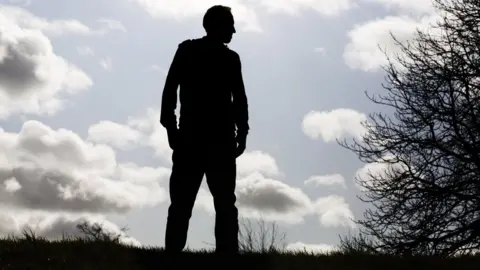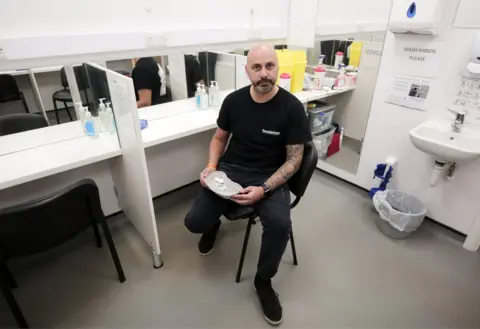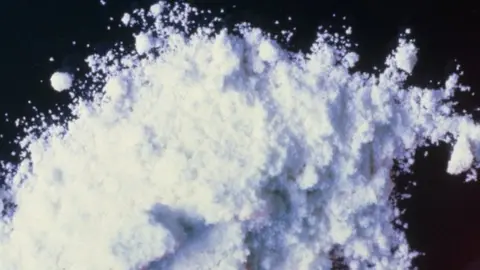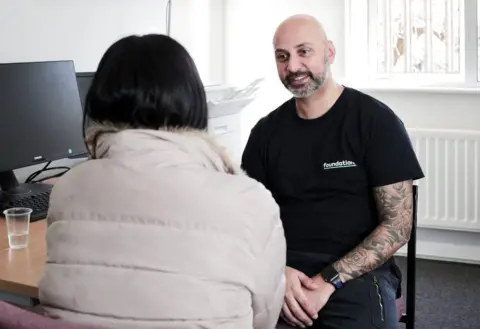Inside the Middlesbrough clinic where heroin users get a 'last chance'
 Stuart Boulton
Stuart BoultonSitting in one of four booths, looking at himself in the mirror under a bright light, James injects himself with diamorphine - pharmaceutical heroin.
He was in a young offenders institution when a cellmate gave him heroin for the first time. James says he was told it was "just like" marijuana. He had no idea he'd still be hooked on opiates more than two decades on.
Now in his early 40s, he is one of the first people in the UK to receive heroin at a clinic. It is located in Middlesbrough, a town where drug deaths rose 16% in 2018 to their highest level since 1993.
Before he joined the scheme, he says he was told: "Listen, you either sort your head out now, or you let someone else come in and take the chance."
He takes one dose in the morning, and another in the afternoon. It is the first time he has been off street drugs since becoming addicted in 1996.
 Stuart Boulton
Stuart Boulton"Before you would use the same syringe more than once. It ruins your arms, ruins your legs," James says. "This, it's clean every single time. There's nothing mixed in with it either. You look back now and think, 'I can't believe what I did do to get by'."
Injecting is "an intimate act", according to Danny Ahmed of Foundations Medical Practice, which hosts the clinic, but patients "quickly become comfortable" using drugs under supervision.
Passionate about improving the "medieval life expectancy" for heroin users, Mr Ahmed hopes his clinic can not only continue to operate, but that others will open around the country, offering the "life-changing" effects that his patients say they have experienced.
The Middlesbrough clinic, the UK's first, according to Cleveland's Police and Crime Commissioner (PCC) Barry Coppinger, opened in October. Diamorphine treatment also became available in Glasgow shortly after.

Heroin in Britain
 Science Photo Library
Science Photo LibraryOscar Wilde described opium dens "where one could buy oblivion" in his 1891 novel The Picture of Dorian Gray.
After World War One, restrictions started to be imposed amid concerns of drug use by returning soldiers.
The Dangerous Drugs Act 1920 meant drugs including heroin could only be distributed by licensed individuals, including doctors.
Diamorphine has been prescribed to treat opiate dependence in the UK since the 1920s, although by the late 1960s the approach which saw doctors widely prescribe the drug for addicts was largely phased out.
Today, a licence from the Home Office is needed to prescribe the drug for treating addiction.
The UK is the latest country to offer Heroin Assisted Treatment, where addicts inject diamorphine in a controlled setting with medical professionals present. It was introduced in Switzerland in 1994 and is also available in Germany and Canada.

The end result is not sobriety, which Mr Ahmed says is simply not an option for some, but a less chaotic existence.
"The medication does what we hope - it helps people stabilise. That's been the key. It's allowed people a structure - that is then giving them a platform to explore other issues.
"For example, we've had a couple of lads who were street homeless who have now got stable accommodation. We've got people starting to engage with the mental health team, starting to explore some of the triggers for their substance use."
Patients in the clinic beam about building relationships with their families after decades of disruption, and they are proud to test negative for street drugs.
They are also thankful for the "last chance" this treatment has given them.
Julie, who is also having treatment at the clinic, told BBC Radio Tees: "I was a big shoplifter and I was doing a lot of drugs. I didn't think this would work. I can't believe how quickly it has worked.
"This is 100% my last chance. I have disrupted my kids' lives a lot through drugs, but now I'm doing this and I know I'm on the right path."
The clinic has been part-funded by Mr Coppinger with further money provided by Durham Tees Valley Community Rehabilitation Company and the Tees and Wear Prisons Group.
The police and crime commissioner has described it as "a tremendous step forward".
"This is the right thing to do," Mr Coppinger has said.
"There's strong evidence it can save lives and reduce harm, and we can't put a monetary value on that."
 Stuart Boulton
Stuart BoultonIt costs £12,000 to put somebody through treatment for a year, the clinic says. James and Julie were among 15 drug users picked to be the first patients, as they were seen as so criminally disruptive in Middlesbrough.
Critics say using public money to give people free drugs is wrong, but supporters of the scheme say treatment is far cheaper than policing such individuals, who, without a guarantee of heroin, resort to crime in order to pay for their street drugs.
It has been estimated by Mr Coppinger that the crimes of the 15 people using the clinic cost Cleveland Police about £800,000 over a two-year period.
James would wake up, use heroin and then worry about how he would get enough drugs to last the rest of the day.
"I'd open my eyes, I'd use. Then I'd run to the town, steal as much as I could in a bag for life, then get to that door and make sure I got out of that door - no matter who I had to push out of the way," he says.
"I needed at least £40 a day for my addiction, so if I'm stealing it out of a shop, it has to be £80 worth of stock. Every day.
"I've stopped doing all that. I've actually had security guards say to me they've noticed the difference."
The names of the patients have been changed.

Follow BBC North East & Cumbria on Twitter, Facebook and Instagram. Send your story ideas to [email protected].
